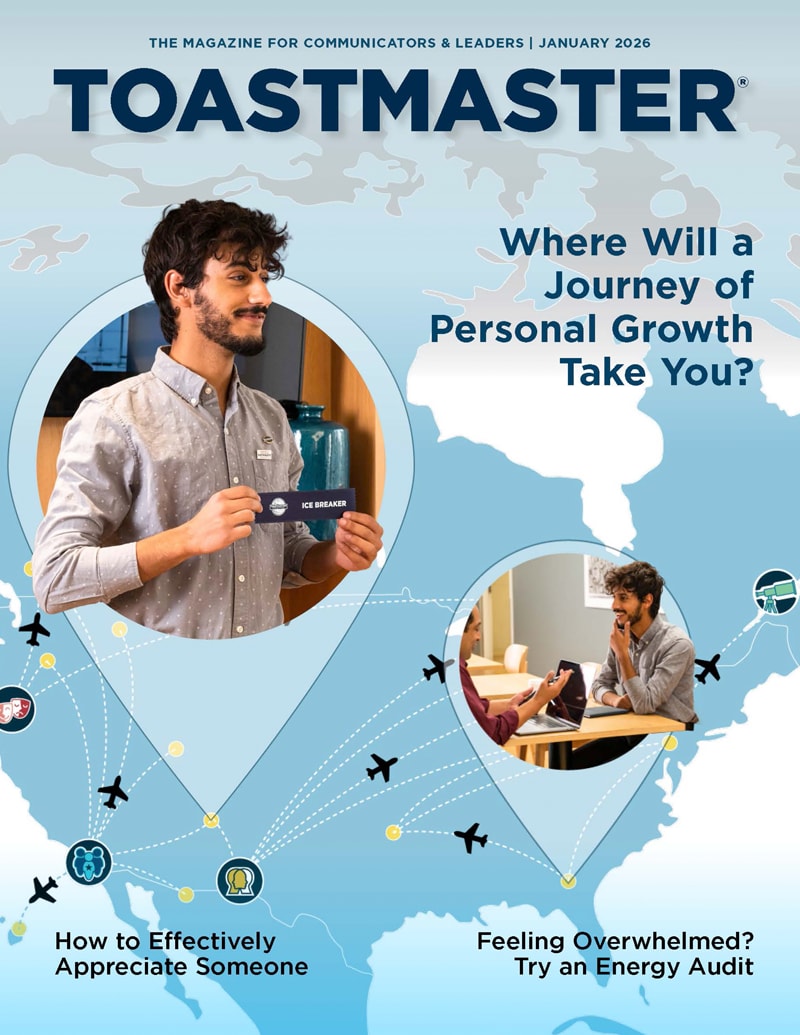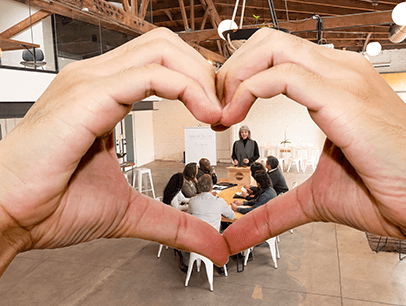There is a positive flow that happens when you increase the feeling of belonging: lower turnover, more engagement, and enhanced performance.
If you want a thriving Toastmasters club or a thriving workplace team, it’s critical to foster a strong sense of belonging. Picture visiting a club meeting where the President greets you warmly, explains how things work, and takes time to introduce you to others. Picture starting a new job and having a manager who takes an interest in you, holds a team lunch in your honor so you have a chance to get to know everyone, and who genuinely thanks you for your input.
In contrast, can you imagine returning to visit, let alone joining a club where you weren’t made to feel welcome? Would you go above and beyond or stay long-term at a workplace where you weren’t embraced and appreciated?
Let’s look at why belonging is so important and seven ways you can foster it.
Our Need for Belonging
For more than 20 years, I’ve been helping companies create high-performing teams, and have learned that one of the most important tasks for leaders is to make sure their team members feel a sense of belonging. Humans are hard-wired with a need to belong.
Work can fulfill that need for connection. So can Toastmasters. When people feel connected, they are more engaged, give higher discretionary effort, and stick around longer. Having a sense of belonging directly impacts both businesses’ and Toastmasters clubs’ growth and success.
Helping people feel they belong isn’t complicated or time-consuming, it just requires intentionality. As a leader you set the tone and make people feel so welcome that they want to be part of something, developing into highly committed team members who go above and beyond.
1 Embrace Diversity
We live in a richly diverse world. Embracing diversity is critical not just to ensure equity and fairness but also to allow organizations a wider range of ideas, results, and solutions. If you consistently hire people with similar demographics, you’ll create a lack of diversity and foster “groupthink” (where people conform to a consensus view rather than voicing their opinions), which inhibits creativity and innovation. When hiring people, it’s vitally important to ensure you aren’t using affinity bias, which is where we’re drawn to people we see as similar to ourselves.
Everyone benefits from interacting with people from different backgrounds, cultures, faiths, and ages, and with distinctive life experiences. Having a diverse team brings a variety of unique insights and experiences to a project or team, and often leads to solutions that wouldn’t have been considered by a more homogenous group.
When people feel connected, they are more engaged, give higher discretionary effort, and stick around longer.
As a leader you can champion diversity, regularly reiterating the benefits of hearing contrasting points of view. Encourage people to show up as themselves and to share their stories.
2 Build Commonality
Fostering commonality isn’t about trying to get people to be the same. It’s about embracing what makes them uniquely different, while finding common ground to build connection and understanding.
Commonality can be found in shared interests, hobbies, tastes, strengths, and communication styles. Leaders can actively uncover these interests and traits by opening meetings with a question of the day, inviting people to share something, such as their favorite family traditions, where they grew up, or what they’re passionate about. The more things you discover you have in common with someone—even someone you may not have immediately warmed to initially because of perceptions or unconscious bias—the better you can work together.
In New Zealand, tikanga Māori is a set of principles that outline suitable behavior and customary practices. Traditionally, meetings start with everyone introducing their forebears and their connections to the regions they’re from and the region they’re visiting, before getting into the purpose of the meeting. This is about honoring those people and places and creating potential connections with others. This practice of taking time to build commonality before diving into business is shared by many other cultures where the success of the preamble often determines the success of the meeting overall.
3 Call Out Cliques
Most of us have been there. The first day at a new school, feeling awkward, not knowing quite what to do or where to go, and seeing groups of people talking and laughing together. Especially for more introverted souls, it can be overwhelming. The same thing can happen when someone joins a new workplace or a new club. Virtually everyone harbors natural (often subconscious) fears like, “Will I fit in?” or “Will they accept me?”
While tight friendships can be good, established cliques make it harder for newcomers to feel included. Call people out if they’re behaving in ways that exclude others—for instance, leaving some people off group emails or only offering to help certain people. To acclimate a new team member (or a new club member), intentionally partner them with a buddy or mentor who can explain how things work and ensure they get off to a good start and aren’t excluded.
First impressions count. At your club meetings, have a designated greeter welcome people as they arrive and ensure guests are made to feel at home, perhaps by introducing them and seating them with others.

4 Foster Collegial Love
Love may not commonly be talked about in the workplace, yet teams that display collegial love—a type of non-romantic love that’s based on warmth and connection—have significantly better outcomes, higher staff satisfaction, and better teamwork. The Greeks coined this type of love philia, defined as “affectionate brotherly love.”
Studies show that the three workplace attitudes that create high-performing teams are joy, interest, and love. Leaders who foster these outcomes help bond individuals to each other, their work, and their organization. You can encourage philia by expressing how much you value people and encouraging them to connect at a personal level rather than being solely task focused. For instance, add fun, light-hearted moments into meetings, such as a joke of the day. Laughter is a connecting force. Get teams to do a daily quiz at break time together. Encourage staff to share “high fives” (sharing specific praise for a colleague). Celebrate birthdays and other milestones together.
Taking the time to foster a team that not only focuses on the end goal but also ensures people feel a sense of belonging, purpose, and happiness is especially important in extremely challenging settings, such as in the military and in elite sports. These teams have strength and discipline, make tough calls, and are focused on important tangible results; they also care deeply about one another and have each other’s backs.
In this video, learn techniques for teamwork from 2019 Toastmasters International Convention speaker Lee Rubin, who provides five essential components to create a strong and confident team.
5 Follow the Platinum Rule
The golden rule teaches us to, “Treat others as you want to be treated,” which is a noble and worthy goal. What is even better, however, is the platinum rule, “Treat others as they want to be treated.”
It’s powerful to understand your default communication style and the fact you’ll naturally think, plan, and communicate using your own style. Understanding and tapping into other people’s styles allows you to better connect with them.
For instance, if you’re a task-focused person, you’ll get better results with your people-focused colleagues if you spend a little more time at the top of the email or the start of the call to check how they’re doing. Conversely, if you’re more people-focused, you’ll profit from minimizing chitchat and getting to the point for your task-focused colleagues.
6 Display Shared Icons
Another way to build belonging is to have visual reminders that reinforce your culture. Think about the pride and connection most people feel when they see their nation’s flag. Seeing consistently branded posters, stationary, uniforms, and badges help create a sense of commonality, pride, and connection.
The more things you discover you have in common with someone—even someone you may not have immediately warmed to initially because of perceptions or unconscious bias—the better you can work together.
Toastmasters’ banners, certificates, and pins all proudly display the instantly recognizable Toastmasters logo. This is key not just for marketing to guests but also for reinforcing belonging among members. We feel instantly connected to and reassured by the familiar logo. Sharing photos on social media highlighting members achievements and displaying the club banner bolsters belonging. It also raises awareness to nonmembers and could lead to a desire to visit and join.
7 Have Shared Catch Phrases
Familiar sayings build a sense of belonging where we have an affinity with the well-known words. A shared vocabulary can glue a team together. When I worked at the New Zealand College of Fitness, we had a whole language that staff embraced. Because the college wanted to encourage a high-energy, positive environment, days of the week were renamed Terrific Tuesday, WOW Wednesday, and Sparkleday Saturday. Lecturers weren’t just lecturers, we were “Presenters of Fun and Laughter”—it was even printed on our name tags! Feedback became “feedforward” and was presented as a positive thing to look forward to, to help us grow. We used the motto “There are no problems, just challenges with three solutions,” whenever we found ourselves in a tough situation. By owning and using these common phrases we felt more connected and in-sync as a team.
Toastmasters comes with a built-in shared vocabulary, think Table Topics®, grammarian, Ah-Counter. I will never forget the day I visited Ottawa Toastmasters Club. Having just moved halfway around the world and not knowing anyone in the city, being welcomed into the club with the familiar Toastmasters phrases felt like coming home. It was a wonderful feeling and certainly made me return!
An Ongoing Commitment
Belonging is something that needs to be continually reinforced; much like in any personal relationship, it’s not enough to say or do things only once. You need to frequently send signals that people are valued.
Reflect on which of these seven things you’re doing well—in your workplace and your Toastmasters club—and most of all, which ones you could enhance. There is a positive flow that happens when you increase the feeling of belonging: lower turnover, more engagement, and enhanced performance. Go out and foster a highly connected team and enjoy the environment that comes from having a team of committed people who care deeply and go above and beyond to deliver their best.
Lauren Parsons, DTM, AS is an award-winning wellbeing specialist, New Zealand’s Keynote Speaker of the Year and Educator of the Year 2023, TEDx speaker, author of Thriving Leaders, Thriving Teams, and host of the Thrive TV Show. She is a sought-after speaker who helps organizations create a positive, energized team culture where people thrive. Visit laurenparsonswellbeing.com.



 Previous
Previous

 Previous Article
Previous Article

